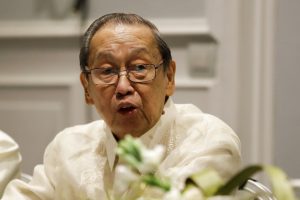Jose Maria Sison, the founder of the Communist Party of the Philippines, whose armed wing has been waging one of Asia’s longest-running insurgencies, has died. He was 83.
Sison died peacefully late Friday after two weeks of confinement in a hospital in Utrecht, the Netherlands, the party’s spokesman, Marco Valbuena, said in a statement on Saturday. The cause of death was not disclosed.
Sison had lived in self-exile in The Netherlands since then-President Corazon Aquino released him from detention in 1986, shortly after the “People Power” revolt overthrew dictator Ferdinand Marcos, the father and namesake of the current Philippine president.
Sison died 10 days before the party he founded in 1968 was marking its 54th anniversary on December 26. Its armed wing, the New People’s Army, was established months later in March 1969, numbering only about 60 Maoist fighters armed with nine automatic rifles and 26 single-shot rifles and pistols. But the movement gradually grew and expanded across the impoverished nation.
Battle setbacks, surrenders and infighting, however, have weakened the guerrilla group, which is considered a terrorist organization by the United States and remains a major Philippine security threat.
The communist rebellion has left about 40,000 combatants and civilians dead. It also has stunted economic development, especially in the countryside, where the military says about 2,000 insurgents are still active.
Past administrations had engaged in on and off peace negotiations with communist rebels represented by the umbrella organization National Democratic Front of the Philippines, where Sison served as chief political consultant.
Former President Rodrigo Duterte ended peace talks in March 2019, and negotiations have not resumed.
“The Filipino proletariat and toiling people grieve the death of their teacher and guiding light,” the party’s statement said.
“Even as we mourn, we vow (to) continue to give all our strength and determination to carry the revolution forward guided by the memory and teachings of the people’s beloved Ka Joma,” the statement added, referring to Sison by his nickname.
Vice President Sara Duterte, daughter of the former president, issued a brief statement on Sison’s death, saying: “May God have mercy on his soul.”
The Department of National Defense said Sison was responsible for the death of thousands of civilians and combatants. It said his death “deprived the Filipino people of the opportunity to bring this fugitive to justice under country’s laws.”
A Manila court in 2019 ordered the arrest of Sison and 37 others for their alleged involvement in a massacre in 1985. A mass grave discovered by soldiers in Inopacan town on Leyte Island in 2006 supposedly contained skeletal remains of rebels killed by their colleagues on suspicion they were informants of the military.
Sison, in a Facebook post in September 2019, denied the accusations against him, saying it was a “fake plot” and that authorities had collected bones from cemeteries to frame him and the others. He said he and the other suspects were in jail at the supposed time of the killings.
Sison, a former youth activist and university professor before founding the Communist Party, played a key role in the bitter split in the ranks of the rebels in the 1990s over differences in strategies. A bloody internal purge left hundreds dead, further weakening the rebels whose numbers have dwindled from a peak of around 25,000.
“A new era without Jose Maria Sison dawns for the Philippines, and we will all be the better for it,” the Defense Department said.
The Communist Party gave no indication about a possible successor to Sison.

































